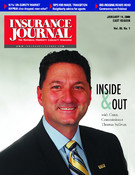Connecticut’s insurance commissioner is a ‘small government kind of guy’ with big company kind of experience
Thomas Sullivan has switched sides — sort of. Before being named Connecticut’s insurance commissioner last year, Sullivan spent years as an insurance industry executive, including his most recent stint with the Specialty Risk Services Unit of The Hartford. In this interview, conducted and edited for length by Insurance Journal Editor Andrew Simpson, Sullivan opens up about making the switch from regulated to regulator, the key insurance issues facing the Nutmeg State, his relationship with state Attorney General Richard Blumenthal and the changes he thinks would make Connecticut’s insurance industry more consumer-friendly.
You’ve spent your career in the private sector side of the insurance industry. How does that experience on the other side help you as a regulator?
Sullivan: Well, I don’t necessarily look at is as being on the other side. While regulation is the watchdog of the industry, the products and services that the industry produces serve a need in the marketplace to our consumers. And I had an active role in terms of my private sector experience of dealing with consumer issues. That benefits me, coming over to the regulator side of the business.
Does it give you a more in-depth understanding of the way the markets work?
Sullivan: Yes. There’s nothing better than consumer feedback. I think that positions me to really critique how the industry is behaving. And not only enforce the laws, but make sure that products and services meet suitability standards, and that they live up to the tests of our regulatory scrutiny.
What specific ways does the department deal with consumer complaints? How do those fit into the structure of regulation?
Sullivan: We handle over 7,000 consumer inquiries in the Connecticut Insurance Department, and they come in all shapes and sizes — from claims disputes to whether or not a product was suitable and properly sold to a consumer. So there’s a wide breadth and range of all kinds of consumer inquiries that we handle in our consumer affairs division. And it’s all the various lines of coverage that we regulate from life and health products to property and casualty products.
I’m sure you’ve heard some complaints about coastal insurance in Connecticut. What’s your assessment of that market today, and what do the rate filings show you about what’s happening?
Sullivan: I would categorize our market as stable. It’s competitive, which is a good thing. I’m concerned that it’s under some price pressure. And much of the price pressure that we’re feeling today, I would call “catch-up” activity, particularly from some of our small mutual companies who had a high concentration along the Connecticut coast.
What steps has the state taken? Has there been any new legislation or regulations that affect what insurers can do?
Sullivan: The legislature in the last session did in fact pass limitations around product form filings on whether or not a consumer for new business chooses mitigation efforts or a wind deductible. Much of what led to that legislation was our underwriting guidelines that preceded the bill that passed in the last session.
Is that having a positive effect?
Sullivan: The effective date of the legislation’s just about to begin, but we found that our carriers were complying with our underwriting guidelines. From a form filing perspective, they’d been very compliant with what we’d identified as the parameters.
What do the filings tell you about rates? Is the pricing pressure still going on?
Sullivan: Yes, the pricing pressure is there. And we have approved what I would categorize as significant increases for a small minority of our companies, who represent less than 9 percent of the total market share. But those companies needed to take some rate action largely due to the costs of reinsurance and other variables that contributed to the pressures for coastal risk.
In addition to rising rates, do you hear concerns from consumers about the underwriting criteria that some companies use either to deny or not cover certain risks?
Sullivan: Yes. And I think some of the reluctance from a consumer perspective is around — especially in Connecticut. Obviously we’re not Mississippi or Florida or one of the Southeastern states. So there is a perception — I’ll call it a perception — that we’re not really exposed to a hurricane event. The models would tell you otherwise.
We have people who have survived, as we’re often told, the Long Island Express, which was the big hurricane back in 1938, and Gloria back in 1985, which by the time it hit the Connecticut coast was downgraded to a category one. So there is a little bit of that perception that we’re immune from coastal risk.
If you believe the prognosticators in terms of global warming and the Atlantic sea temperatures warming, all the things that lead the modelers to conclude that we’re at more risk than we were before. There are obviously two schools of thought.
What about on the commercial property side, especially on the coast of Connecticut? Any concerns?
Sullivan: Yes, there are concerns. I would say it’s a little tighter than I would like it, particularly for commercial habitational. I’m talking about condominiums and bed-and-breakfast type risks. Those seem to be a little bit more difficult to place.
There’s been some discussion among state regulators about access to the information in catastrophe models used by insurers. Should regulators know more of what goes into the models?
Sullivan: It’s good for everyone to understand, and have some transparency into what’s behind the models. Having said that, there are a couple modelers who get all the headlines. I wouldn’t call that a highly competitive market in terms of modelers out there, which leads everyone to question the impact of the modelers on the rest of the marketplace.
That’s kind of the first domino, if you will, in terms of what led us to look nationwide at coastal risk in terms of price and availability. When you start with changing prognostications, it makes all the other dominoes that come after that one change and increase in impact.
The National Association of Insurance Commissioners recently held a hearing on that subject to talk about the modelers and their impact into the industry. Hopefully we’ll gain some more transparency into understanding their assumptions.
Conn. Attorney General Richard Blumenthal gets involved in insurance issues. What’s the relationship there? How do you work with him?
Sullivan: He is an elected officer, as you point out. I’m appointed by the governor. I have all my authority codified in statute by virtue of Title 38-A of the Connecticut General Statutes. I am the regulator of the insurance industry. He has some crossover into the insurance industry and all commerce, frankly, in this state through some of his authority.
But the authority to regulate the industry resides with my office, and I would say our working relationship is growing. We’ve had a number of conversations on issues of significance and we’re doing our best to keep him briefed on areas where we need to keep him in the loop.
The U.S. House of Representatives recently passed a measure which included adding the option of windstorm coverage to the federal flood policy. Do you think that’s a good idea?
Sullivan: No. I opposed the Taylor Bill, the bill you’re talking about. I don’t believe it’s fiscally responsible, nor do I believe it is practically constructed in a manner that would serve the market — primarily because it threatens the private market. Although I understand the need to address the concurrency issue, I don’t believe solving the problem through a vehicle which is already in jeopardy — that being the National Flood Insurance Program — which is underfunded and structurally (unsound). The underlying fundamentals of how that program is managed both fiscally and operationally are coming under question. I don’t see dragging a wind peril into that program as a solution.
Should the federal government be involved in some kind of back-up or catastrophe plan of some sort?
Sullivan: I don’t support natural catastrophe backstops by the federal government. I believe the federal government’s role is overseer, not intervener. I believe in less government, not more. Natural catastrophe events have been around as long as Mother Nature herself, right? So I believe underwriters given good quality data should be able to underwrite those risks.
Do you believe it’s your role to encourage the growth of the insurance industry?
Sullivan: In some respects, yes. In so much as the growth meets the demands of our consuming public. As long as our member companies can produce products and services that meet those demands and innovate and create, then yes. We should promote the industry to the extent that it meets a consumer demand.
So much gets focused on coastal insurance these days. Are there other issues you’re working on that haven’t received as much attention?
Sullivan: I would say while coastal is a big priority, just because of the consumer concern — and whenever there’s consumer concern, we have deep concern in the agency — I wouldn’t point to any one particular area. We take our role as regulators very seriously. We just issued our quarterly report around consumer complaint activity. We saved over a million dollars for Connecticut consumers over the last quarter. We’re very proud of the activism and the role that my folks back home in Hartford play, in terms of advocating for our residents.
What is the budget of your department?
Sullivan: Roughly $22 million.
Is that sufficient?
Sullivan: You have to understand, I’m a small government kind of guy [laughs]. If I were to tell you anything differently, I’d be violating my own personal principles. I do think it’s sufficient. If you gave me more resources, I wouldn’t turn them away. On the other hand, I try to be fiscally responsible with the taxpayers’ dollars.
If you were given more resources, what might you spend them on?
Sullivan: Probably in market conduct areas and consumer services.
I don’t have the money to give you, but I want thank you for your time.
Sullivan: OK. I appreciate it.
Was this article valuable?
Here are more articles you may enjoy.


 The $3 Trillion AI Data Center Build-Out Becomes All-Consuming for Debt Markets
The $3 Trillion AI Data Center Build-Out Becomes All-Consuming for Debt Markets  Maine Plane Crash Victims Worked for Luxury Travel Startup Led by Texas Lawyer
Maine Plane Crash Victims Worked for Luxury Travel Startup Led by Texas Lawyer  Married Insurance Brokers Indicted for Allegedly Running $750K Fraud Scheme
Married Insurance Brokers Indicted for Allegedly Running $750K Fraud Scheme  Longtime Alabama Dentist Charged With Insurance Fraud in 2025 Office Explosion
Longtime Alabama Dentist Charged With Insurance Fraud in 2025 Office Explosion 


